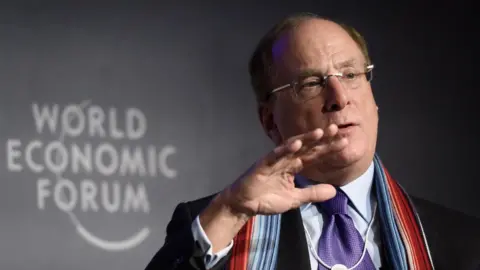Has Airbnb grown a conscience?
 Getty Images
Getty ImagesCorey Klein would like to believe Airbnb's recent promise that it will make a "positive contribution to society". But the 37-year-old lawyer, who lives directly below one of the platform's rentals, has his doubts.
Last year, the tech giant spent more than $4m (£3.1m) in an effort to fend off new rules in the city where Mr Klein lives in New Jersey.
The bruising battle was eventually won by critics like Mr Klein, who said that Airbnb, if left unchecked, would drive up rents and turn his neighbourhood into a springboard for budget-conscious travellers bound for New York City, just across the river.
"I hadn't signed up to live in a hotel," says Mr Klein, who sits on the board of the Hamilton Park Neighborhood Association in Jersey City.
"The problem is the scale of it." he says. "Both myself and my neighbours were sort of getting squeezed out."
'Positive impact'
Airbnb, whose website boasts listings in more than 220 countries, has faced similar fights around the world, from Barcelona to Berlin to Boston. Last month, it made its clearest case yet for why Mr Klein and others like him should not be so worried.
In a public letter on its website, it promised to do business with an eye towards "all stakeholders" - including local communities.
Among other steps, the firm said it would put $150m to safety measures, host a "stakeholder" day to hear from the public, and offer $100m to local initiatives over the next 10 years.
"Our commitment is to make sure that Airbnb does have a positive impact," co-founder Nathan Blecharczyk says.

Airbnb's promises place it at the centre of a broader debate in the American business world asking whether its longstanding focus on earning profits for shareholders has gone too far.
The discussion is partly a response to outside pressure from consumer boycotts, staff walkouts and social media shame campaigns.
Rising numbers of investors with social aims and attacks by Democratic presidential candidates - such as Elizabeth Warren and Bernie Sanders - have added to the heat.
But while there have been plenty of calls for reform since the 2008 financial crisis, this time companies seem to have taken their critics to heart.
Corporate support
Last year, 181 firms signed onto a statement by the influential business lobby, the Business Roundtable, affirming that corporate responsibilities extend beyond shareholders.
It was a pointed rejection of a view of shareholder primacy that has served as an article of faith since economist Milton Friedman made it a rallying cry among the American business community in the 1970s.
The topic of "stakeholder capitalism" was the theme of this year's World Economic Forum in Davos and the subject has continued to percolate in public letters from investment giants, such as BlackRock's Larry Fink and Bridgewater's Ray Dalio.
"We're seeing support from corporations themselves in a way that is remarkable when even compared to a few years ago," says New York Law School professor Tamara Belinfanti.
 Getty Images
Getty ImagesThere's plenty of evidence that the old priorities still rule. After the US cut corporate tax rates in 2017, companies used much of the extra cash to buy their own stock - delivering money to shareholders.
But as inequality grows and climate change worsens - without a meaningful political response - business leaders are increasingly "seeing the writing on the wall, that the usual way to approaching business has failed", says CB Bhattacharya, a professor at the University of Pittsburgh's Katz Graduate School of Business.
In recent years, firms such as Amazon, Microsoft and Goldman Sachs have announced a blitz of programmes aimed at improving their environmental footprint, bettering worker benefits, and boosting diversity among staff.
Prof Bhattacharya, the author of 'Small Actions, Big Difference', cautions that the actions promised by many companies don't necessarily live up to the talk.
"Unless we see more companies that are actually changing their business models and doing more on the sustainability front, this will only be paper promises," he says.
Gearing up to IPO
Mr Blecharczyk says Airbnb, which is gearing up to sell shares on the public market, is creating a framework that will help it resist pressure to focus on short-term profit.
For example, it will tie staff bonuses to safety metrics and hear from the public via the stakeholder meeting.
"We're not talking just abstractly about these important issues," he says. "We're actually saying, here's exactly how we hold ourselves accountable."
The development of metrics is important, says Sarah Kaplan, professor at the University of Toronto's Rotman School of Management.
But she notes that the firm has focused on matters - like guest safety - that are in its interest to address ahead of its sale of shares to the public.
"There is a very self-interested aspect of what they're doing," she says, pointing to recent killings at homes rented through the site. "If they're going to IPO, they have to manage the risk associated with their business."
 Getty Images
Getty ImagesPotential regulation, like that in Jersey City, represents a more than $10bn threat to Airbnb's growth, according to research firm Truvalue Labs, which tracks companies on environmental, social and governance (ESG) issues.
Airbnb's stakeholder pledge is a "good sign" but hasn't lessened that risk, says Andre Shepley, product manager for ESG Integration.
"Sustainability is about outcomes not intentions," he says. "Until we start seeing different outcomes, where there's observably less risk ... that's when I think the view in terms of investment thesis will change."
But Airbnb can't be too radical, cautions Prof Belinfanti.
Shareholders coming first took root, in part, because it offered a clear way to evaluate business performance.
And there is a limit to how much control public investors - whose share purchases would fund Airbnb - will be willing to cede, she says.
"I'm not sure how much the market can bear," she says.
Mr Blecharczyk says he knows that the steps the firm has outlined will not satisfy all of its critics.
"There's going to be issues and I guess our approach is, 'Let's confront those issues'," he says. "The worst thing you can do is to not try at all."
